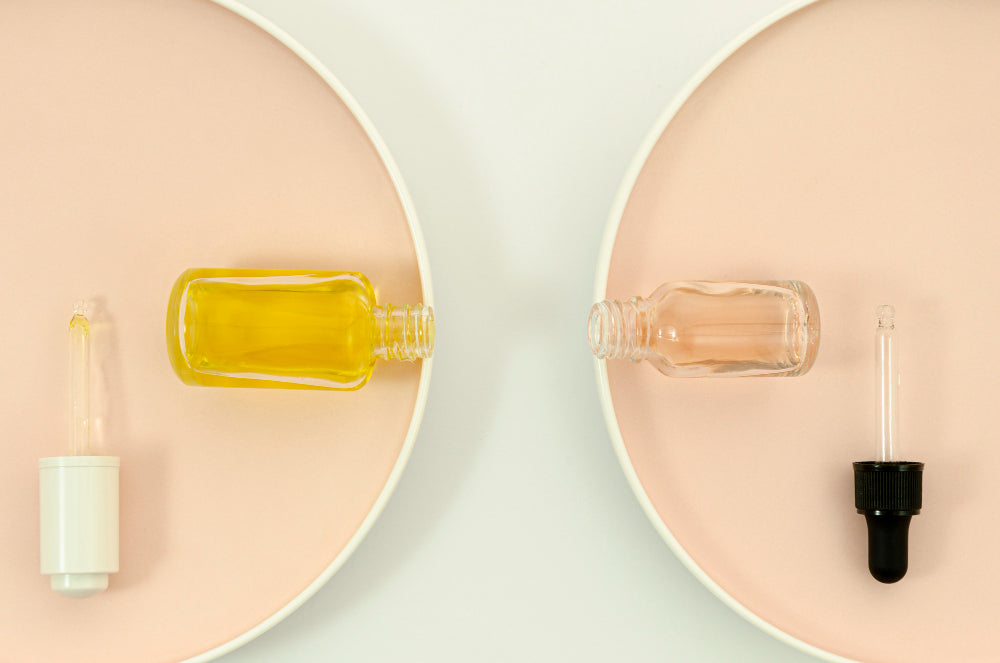Tretinoin vs Retinol: Which One is Better?


Selecting the appropriate skincare products is crucial for maintaining healthy skin. The efficacy of these products lies in their active ingredients, which should align with individual skin types and concerns. Among the myriad of skincare ingredients available, Tretinoin and Retinol stand out due to their proven benefits in numerous skin care regimens.
Tretinoin and Retinol are renowned for their effectiveness in treating a range of skin issues, from acne to signs of ageing. Despite their similarities, they differ significantly in terms of composition, side effects, and usage guidelines. This article aims to dissect these differences and provide an in-depth comparison to assist readers in making informed decisions tailored to their skincare needs.
Tretinoin is better for severe acne and significant aging signs, while Retinol is suited for milder issues and sensitive skin. The choice depends on your skin needs and tolerance. Tretinoin is generally considered more effective for treating severe acne and more pronounced signs of aging, such as deep wrinkles and sun damage, because it is a stronger, prescription-strength retinoid. It promotes rapid skin cell turnover and can provide noticeable results faster than Retinol.
However, due to its potency, Tretinoin can cause more side effects, such as redness, peeling, and irritation, especially in individuals with sensitive skin or those who are new to retinoids. Its use should be closely monitored by a healthcare professional.
On the other hand, Retinol is a milder, over-the-counter option suitable for those with mild to moderate skin concerns or for individuals seeking to prevent signs of aging. It is better tolerated than Tretinoin and can be a good starting point for those new to retinoids. While Retinol works more slowly and may take longer to show results, it generally causes fewer side effects, making it a preferred option for those with sensitive skin.
Ultimately, the choice between Tretinoin and Retinol depends on your specific skin concerns, how quickly you want to see results, and how well your skin can tolerate potent ingredients. It's important to consider these factors and possibly consult with a dermatologist to determine which option is better for your skin type and goals.
Tretinoin, a derivative of Vitamin A, is known chemically as all-trans retinoic acid. It is a prescription-strength compound that plays a pivotal role in skin cell growth and differentiation. Dr. Sarah Jones, a dermatologist with over 20 years of experience, states, "Tretinoin fundamentally alters the behaviour of skin cells and can modify gene expression, resulting in improved skin texture and reduced acne."
Tretinoin works by promoting the turnover of skin cells and preventing the clogging of hair follicles, which can lead to acne formation. Furthermore, it stimulates collagen production, which can reduce the appearance of fine lines and wrinkles. According to Dr. Jones, "The mechanism by which Tretinoin acts involves both the shedding of old skin cells and the acceleration of new cell growth, which is crucial for combating acne and signs of ageing."
Predominantly used in the treatment of acne, Tretinoin has also shown significant efficacy in reducing the appearance of fine lines, wrinkles, and skin discoloration. A 2019 study published in the Journal of Dermatological Science found that regular use of Tretinoin significantly improved the skin's overall texture and elasticity. Dr. Jones corroborates this, noting, "Patients using Tretinoin often see noticeable improvements in their skin condition, especially those suffering from photoaged skin."
While Tretinoin is effective, it can cause side effects such as skin irritation, redness, and peeling, particularly during the initial weeks of use. Dr. Emily Clark, another esteemed dermatologist, advises, "Patients should start with a lower concentration of Tretinoin and gradually increase as tolerated to mitigate side effects." It is also imperative to use sunscreen regularly, as Tretinoin can increase the skin's sensitivity to sunlight.
Retinol, another derivative of Vitamin A, is less potent than Tretinoin and available over the counter. It converts into retinoic acid, the active form, when applied to the skin, albeit at a slower rate compared to Tretinoin. Dr. Clark explains, "Retinol is a gentler alternative to Tretinoin, making it suitable for those with sensitive skin or those new to retinoids."
Similar to Tretinoin, Retinol aids in skin cell turnover and collagen production but at a milder and slower pace. This makes it less likely to cause severe irritation, which can be an advantage for individuals with sensitive skin. Dr. Jones states, "While Retinol takes longer to show results, it remains an effective option for improving skin texture and reducing the signs of ageing."
Retinol is widely used for its anti-ageing properties, including reducing the appearance of fine lines and sun damage. It is also beneficial for acne-prone skin, although less effective than Tretinoin. A 2018 survey in the Dermatology and Therapy journal reported that users of Retinol-based products experienced visible improvement in their skin's appearance within 12 weeks.
Retinol is typically better tolerated than Tretinoin, but it can still cause dryness, redness, and peeling, especially in higher concentrations. Dr. Clark suggests, "To minimise side effects, start with a low concentration of Retinol and apply it every other night, gradually working up to nightly use as your skin adapts." Additionally, the use of sunscreen is recommended due to increased photosensitivity.

Tretinoin and Retinol are both utilised for similar skin concerns, including acne and the signs of ageing. Tretinoin, however, is generally considered more potent and faster acting, particularly for severe acne and pronounced wrinkles. Dr. Laura Benson, a dermatological researcher, notes, "Clinical studies consistently demonstrate that Tretinoin has a more immediate and noticeable effect on severe skin conditions compared to Retinol." Conversely, Retinol is recommended for those with milder skin concerns or for preventative care.
Tretinoin is available in various concentrations, typically ranging from 0.025% to 0.1%, allowing for tailored treatment based on the severity of the skin condition and the user's sensitivity. Retinol concentrations are generally lower, given its over-the-counter status, and are found in formulations from 0.1% to 1%. The formulation of Retinol products may also include other ingredients to mitigate potential irritation and support skin health.
The side effects of Tretinoin can be more severe than those of Retinol, including peeling, redness, and increased sensitivity, particularly at higher concentrations. Dr. Benson suggests, "Patients often experience a 'purging' phase with Tretinoin, which can initially exacerbate skin issues before improvement is seen." Retinol, while it can also cause irritation, typically results in less severe side effects, making it a more suitable option for those with sensitive skin.
Tretinoin requires a prescription in most regions, making it less accessible than Retinol, which can be purchased over the counter. This distinction often influences the choice between the two, as Dr. Emily Clark points out, "Accessibility can significantly impact a patient's decision, with those seeking immediate treatment often opting for over-the-counter Retinol products."
While the initial cost of Retinol products may be lower, the need for continuous use over a longer period to maintain results can accumulate costs. Tretinoin, although potentially more expensive upfront, especially if considering the price of a doctor’s consultation, may prove more cost-effective over time due to its potency and the quicker results it delivers.
Individuals suffering from moderate to severe acne, significant photo-damage, or pronounced signs of ageing may benefit most from Tretinoin. Dermatologists typically recommend it for patients who have not responded to milder treatments.
Tretinoin is best suited for oily and less sensitive skin types due to its potent formula. Conditions such as cystic acne, severe hyperpigmentation, and deep wrinkles can show marked improvement with Tretinoin use.
Starting with a low concentration and gradually increasing based on skin tolerance can help minimise side effects. Application should be limited to a pea-sized amount in the evening, following a gentle cleansing and drying of the skin. Integrating a moisturiser and daily sunscreen into the routine is crucial to protect the skin and enhance results.
Retinol is suitable for individuals looking to address early signs of ageing, mild to moderate acne, or those seeking to improve skin texture and radiance. It is also a viable option for those with sensitive skin that cannot tolerate Tretinoin.
Retinol benefits all skin types, particularly those with mild skin concerns or those looking for a preventive anti-ageing product. It is well-suited for dry, combination, or sensitive skin types due to its milder formulation.
New users should start with a lower concentration, applying the product every other night to gauge skin tolerance. Incorporating a rich moisturiser and strict sun protection into the regimen is essential to counteract dryness and sensitivity.
Individual skin types and conditions dictate the choice between Tretinoin and Retinol. Dermatologists play a crucial role in assessing skin health and recommending appropriate treatments. Dr. Laura Benson emphasises, "Personalised skincare is not a trend but a necessity; what works for one person may not work for another." Patch tests and professional consultations are advised to ensure safety and efficacy.
Whether retinol or tretinoin is better depends on the individual's skin type, concerns, and tolerance. Tretinoin is a prescription-strength retinoid, known for its effectiveness in treating severe acne and pronounced signs of ageing more rapidly and intensively than retinol. However, it can cause significant irritation and is not suitable for all skin types.
Retinol, on the other hand, is milder, available over the counter, and generally better tolerated, making it suitable for sensitive skin and those new to retinoids. It is effective for mild to moderate skin concerns and as a preventive anti-ageing treatment. The choice between the two should be based on the individual's specific skin needs and under the guidance of a dermatologist.
Tretinoin is not widely available over the counter in the UK due to its potent nature and potential side effects. In the UK, tretinoin is classified as a prescription-only medication, which means it can only be obtained with a prescription from a healthcare professional. This regulation ensures that its use is monitored by a medical professional to prevent misuse and manage any adverse effects effectively. However, tretinoin can be prescribed by dermatologists in the UK for specific skin conditions, such as severe acne, after evaluating the patient's skin type and concerns.
Continue reading to find the Best Anti-Aging Serums: Dermatologist Recommendations.
Yes, tretinoin can be used every night, but this should be guided by the tolerance of your skin and the advice of your dermatologist. It is common to start with applications two to three times a week and gradually increase to nightly use as the skin becomes more accustomed to the treatment. Some individuals may experience significant irritation, redness, and peeling when starting tretinoin, making it necessary to adjust the frequency of application. It is essential to follow a dermatologist’s recommendations and listen to your skin's response when using tretinoin to avoid excessive irritation.
Yes, you can switch from retinol to tretinoin, especially if you are seeking more pronounced anti-ageing or acne treatment results and your skin can tolerate stronger retinoids. However, this transition should be done cautiously to minimise skin irritation. Typically, it is recommended to phase out retinol gradually while introducing tretinoin at a low concentration, starting with fewer applications per week and increasing as tolerated.
Before making the switch, it is advisable to consult with a dermatologist to ensure it is an appropriate step for your skincare goals and to receive guidance on how to make the transition smoothly while maintaining skin health.
Both Tretinoin and Retinol have their place in skincare regimens, each with unique benefits and considerations. The choice between the two should be informed by individual skin concerns, sensitivity, and desired outcomes, ideally under the guidance of a dermatological professional. Whether combating severe acne with Tretinoin or preventing early signs of ageing with Retinol, personalisation remains key to achieving optimal skin health and appearance.










Plus get the inside scoop on our latest content and updates in our monthly newsletter.